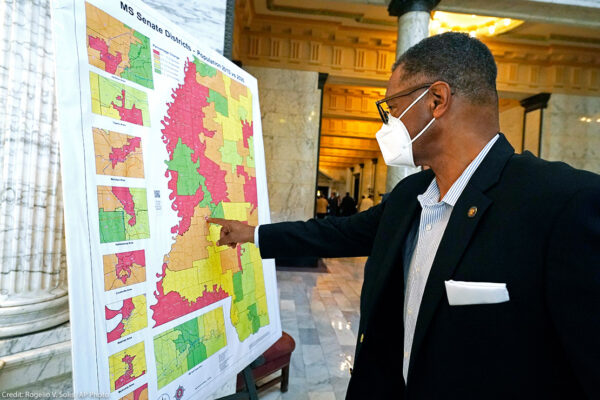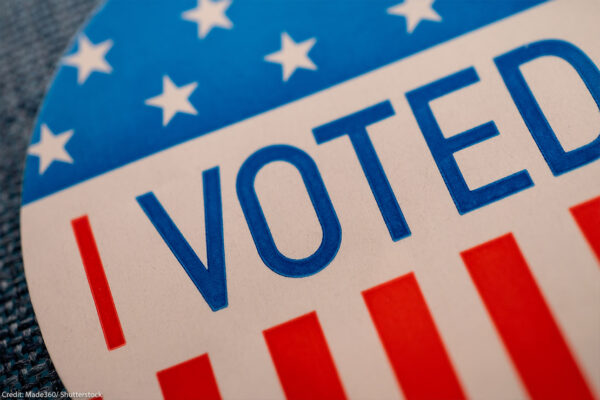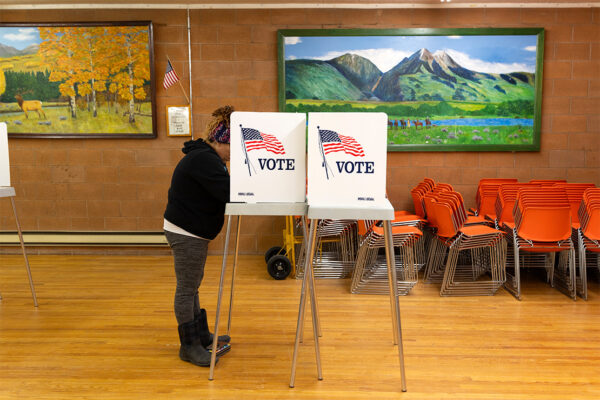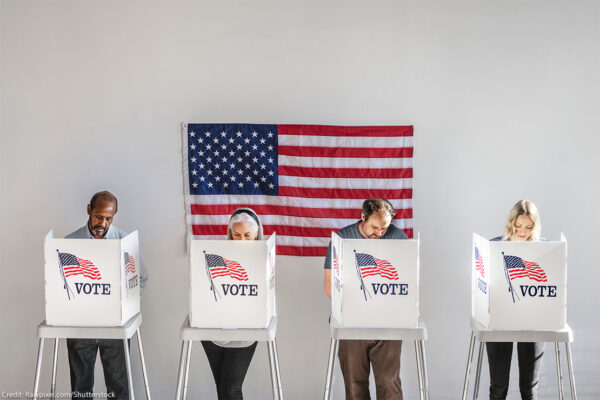Voting Rights
League of Women Voters Education Fund v. Trump
On March 25, 2025, in a sweeping and unprecedented Executive Order, President Trump attempted to usurp the power to regulate federal elections from Congress and the States. Among other things, the Executive Order directs the Election Assistance Commission‚ÄĒan agency that Congress specifically established to be bipartisan and independent‚ÄĒto require voters to show a passport or other citizenship documentation in order to register to vote in federal elections. If implemented, the Executive Order would threaten the ability of millions of eligible Americans to register and vote and upend the administration of federal elections.
On behalf of leading voter registration organizations and advocacy organizations, the ļž–” ”∆Ķ and co-counsel filed a lawsuit to block the Executive Order as an unconstitutional power grab.
Status: Ongoing
View Case
Learn ļž–” ”∆Ķ Voting Rights
Featured
U.S. Supreme Court
Oct 2025

Voting Rights
State Board of Election Commissioners v. Mississippi State Conference of the NAACP
Mississippi has a growing Black population, which is already the largest Black population percentage of any state in the country. Yet. Black Mississippians continue to be significantly under-represented in the state legislature, as Mississippi’s latest districting maps fail to reflect the reality of the state’s changing demographics. During the 2022 redistricting process, the Mississippi legislature refused to create any new districts where Black voters have a chance to elect their preferred representative. The current district lines therefore dilute the voting power of Black Mississippians and continue to deprive them of political representation that is responsive to their needs and concerns, including severe disparities in education and healthcare.
U.S. Supreme Court
Oct 2025

Voting Rights
Louisiana v. Callais (Callais v. Landry)
Whether the congressional map Louisiana adopted to cure a Voting Rights Act violation in Robinson v. Ardoin is itself unlawful as a gerrymander.
Missouri
Sep 2025

Voting Rights
Wise v. Missouri
In unprecedented fashion, the State of Missouri has redrawn the district lines used for electing members of Congress for a second time this decade. These new district lines are gerrymandered and will harm political representation for all Missourians, particularly Black residents in Kansas City, who have been divided along racial lines.
U.S. Supreme Court
Sep 2025

Voting Rights
Racial Justice
Allen v. Milligan
Whether Alabama’s congressional districts violate Section 2 of the Voting Rights Act because they discriminate against Black voters. We succeeded in winning a new map for 2024 elections which, for the first time, has two congressional district that provide Black voters a fair opportunity to elect candidates of their choosing despite multiple attempts by Alabama to stop us at the Supreme Court. Despite this win, Alabama is still defending its discriminatory map, and a trial was held in February 2025 to determine the map for the rest of the decade.
In May 2025, a federal court ruled that Alabama's 2023 congressional map both violates Section 2 of the Voting Rights Act and was enacted by the Alabama Legislature with racially discriminatory intent.
Mississippi
Aug 2025

Voting Rights
White v. Mississippi State Board of Elections
District lines used to elect Mississippi’s Supreme Court have gone unchanged for more than 35 years. We’re suing because this dilutes the voting strength of Black residents in state Supreme Court elections, in violation of the Voting Rights Act and the U.S. Constitution.
Louisiana
Aug 2025

Voting Rights
Nairne v. Landry
Nairne v. Landry poses a challenge under Section 2 of the Voting Rights Act of 1965 to Louisiana’s House and Senate legislative maps on behalf of plaintiff Black voters and Black voters across the state.
All Cases
167 Voting Rights Cases

Minnesota
Oct 2025
Voting Rights
United States v. Simon
Representing the League of Women Voters Minnesota, Common Cause, and two Minnesota voters with past felony convictions, the ļž–” ”∆Ķ Voting Rights Project and ļž–” ”∆Ķ of Minnesota have filed a motion to intervene in a federal lawsuit over the federal government‚Äôs demand that Minnesota turn over its entire voter registration rolls, including with voters‚Äô sensitive personal data such as drivers‚Äô license numbers and partial social security numbers.
Explore case
Minnesota
Oct 2025

Voting Rights
United States v. Simon
Representing the League of Women Voters Minnesota, Common Cause, and two Minnesota voters with past felony convictions, the ļž–” ”∆Ķ Voting Rights Project and ļž–” ”∆Ķ of Minnesota have filed a motion to intervene in a federal lawsuit over the federal government‚Äôs demand that Minnesota turn over its entire voter registration rolls, including with voters‚Äô sensitive personal data such as drivers‚Äô license numbers and partial social security numbers.

Alaska
Sep 2025
Voting Rights
Racial Justice
Smith v. State of Alaska (Amicus)
The ļž–” ”∆Ķ and ļž–” ”∆Ķ of Alaska have filed an amicus in support of Tupe Smith, a woman born in American Samoa who now lives in Whittier, Alaska charged with falsely affirming that she was a U.S. citizen when she registered to vote. But Tupe Smith is not an ‚Äúalien‚ÄĚ under the law. People, like her, born in the U.S. territory of American Samoa are the only remaining individuals recognized as ‚Äúnon-citizen U.S. nationals,‚ÄĚ a unique status that falls short of ‚Äúcitizen‚ÄĚ but nonetheless recognizes that American Samoa has been part of the United States for over 125 years.
All evidence indicates that Ms. Smith believed that, as a non-citizen U.S. national, she was eligible to vote in local elections when she registered to vote. In fact, local election officials encouraged her to check the box labeled "U.S. citizen" when she registered, given the fact that there was no option for "U.S. national."
Our amicus brief urges Alaska’s Court of Appeals to dismiss Tupe Smith’s indictment because of well-settled principles that election-crime statutes should be construed to avoid punishing innocent mistakes. Separately, we warn that upholding a different view of the law would make Alaska an outlier among the states.
Explore case
Alaska
Sep 2025

Voting Rights
Racial Justice
Smith v. State of Alaska (Amicus)
The ļž–” ”∆Ķ and ļž–” ”∆Ķ of Alaska have filed an amicus in support of Tupe Smith, a woman born in American Samoa who now lives in Whittier, Alaska charged with falsely affirming that she was a U.S. citizen when she registered to vote. But Tupe Smith is not an ‚Äúalien‚ÄĚ under the law. People, like her, born in the U.S. territory of American Samoa are the only remaining individuals recognized as ‚Äúnon-citizen U.S. nationals,‚ÄĚ a unique status that falls short of ‚Äúcitizen‚ÄĚ but nonetheless recognizes that American Samoa has been part of the United States for over 125 years.
All evidence indicates that Ms. Smith believed that, as a non-citizen U.S. national, she was eligible to vote in local elections when she registered to vote. In fact, local election officials encouraged her to check the box labeled "U.S. citizen" when she registered, given the fact that there was no option for "U.S. national."
Our amicus brief urges Alaska’s Court of Appeals to dismiss Tupe Smith’s indictment because of well-settled principles that election-crime statutes should be construed to avoid punishing innocent mistakes. Separately, we warn that upholding a different view of the law would make Alaska an outlier among the states.

South Carolina Supreme Court
Sep 2025
Voting Rights
League of Women Voters of South Carolina v. Alexander
This case involves a state constitutional challenge to South Carolina’s 2022 congressional redistricting plan, which legislators admit was drawn to entrench a 6-1 Republican majority in the state’s federal delegation. Plaintiff the League of Women Voters of South Carolina has asked the state’s Supreme Court to conclude that the congressional map is an unlawful partisan gerrymander that violates the state constitution.
Explore case
South Carolina Supreme Court
Sep 2025

Voting Rights
League of Women Voters of South Carolina v. Alexander
This case involves a state constitutional challenge to South Carolina’s 2022 congressional redistricting plan, which legislators admit was drawn to entrench a 6-1 Republican majority in the state’s federal delegation. Plaintiff the League of Women Voters of South Carolina has asked the state’s Supreme Court to conclude that the congressional map is an unlawful partisan gerrymander that violates the state constitution.

Texas
Sep 2025
Voting Rights
League of United Latin American Citizens (LULAC) v. Texas (Amicus)
In August 2025, during a special session called to further gerrymander Texas‚Äôs congressional map, the State‚Äôs legislature passed a districting plan that weakens electoral opportunities for Black and Hispanic voters. Along with other partner civil rights and racial justice organizations, the ļž–” ”∆Ķ and ļž–” ”∆Ķ of Texas have filed an amicus brief in federal court to support plaintiffs challenging Texas's new maps. Our brief argues that Texas‚Äô justifications for mid-decade redistricting are baseless and emphasizes that lawmakers cannot augment their political power by intentionally harming Black and Hispanic voters.
Explore case
Texas
Sep 2025

Voting Rights
League of United Latin American Citizens (LULAC) v. Texas (Amicus)
In August 2025, during a special session called to further gerrymander Texas‚Äôs congressional map, the State‚Äôs legislature passed a districting plan that weakens electoral opportunities for Black and Hispanic voters. Along with other partner civil rights and racial justice organizations, the ļž–” ”∆Ķ and ļž–” ”∆Ķ of Texas have filed an amicus brief in federal court to support plaintiffs challenging Texas's new maps. Our brief argues that Texas‚Äô justifications for mid-decade redistricting are baseless and emphasizes that lawmakers cannot augment their political power by intentionally harming Black and Hispanic voters.

Montana
Sep 2025
Voting Rights
Montana Federation of Public Employees v. Montana
Representing Western Native Voice and four sovereign tribal nations in Montana, the ļž–” ”∆Ķ, ļž–” ”∆Ķ of Montana, and Native American Rights Fund (NARF) challenged the latest in a line of Montana laws that hinder Native American participation in the state‚Äôs electoral process ‚ÄĒ SB 490, which drastically limits access to Election Day voter registration (EDR) in Montana. These laws violate a number of provisions in the Montana Constitution: the right to vote, equal protection, and due process.
Explore case
Montana
Sep 2025

Voting Rights
Montana Federation of Public Employees v. Montana
Representing Western Native Voice and four sovereign tribal nations in Montana, the ļž–” ”∆Ķ, ļž–” ”∆Ķ of Montana, and Native American Rights Fund (NARF) challenged the latest in a line of Montana laws that hinder Native American participation in the state‚Äôs electoral process ‚ÄĒ SB 490, which drastically limits access to Election Day voter registration (EDR) in Montana. These laws violate a number of provisions in the Montana Constitution: the right to vote, equal protection, and due process.
